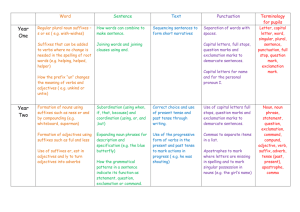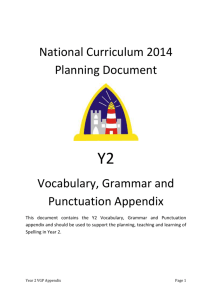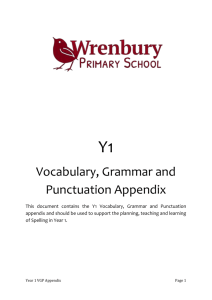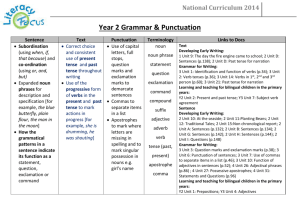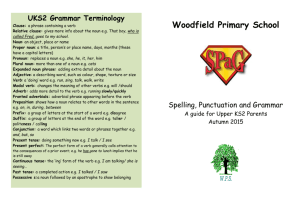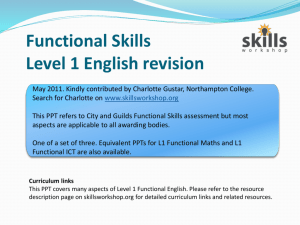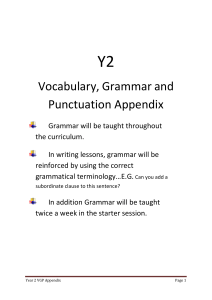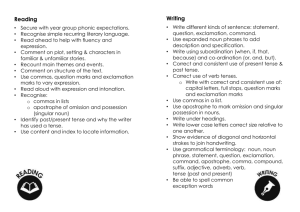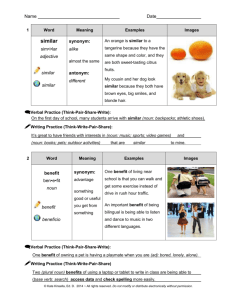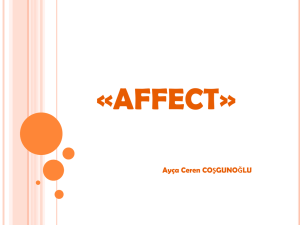Key Stage 1
advertisement
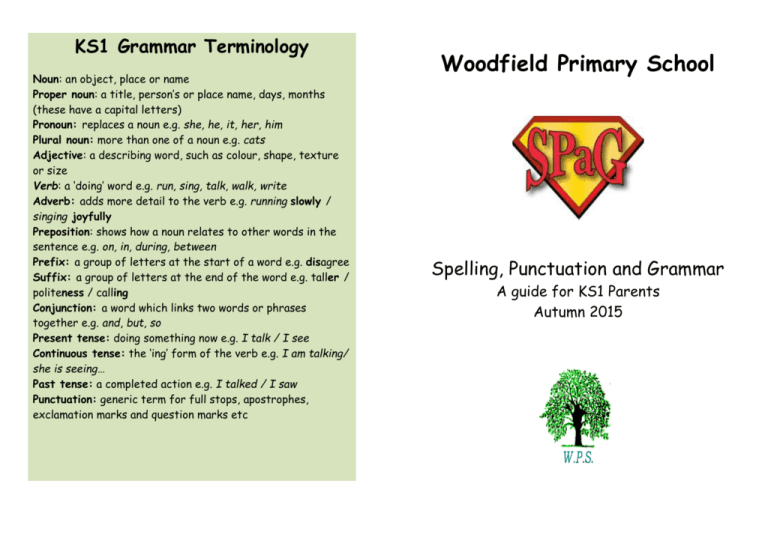
KS1 Grammar Terminology Noun: an object, place or name Proper noun: a title, person’s or place name, days, months (these have a capital letters) Pronoun: replaces a noun e.g. she, he, it, her, him Plural noun: more than one of a noun e.g. cats Adjective: a describing word, such as colour, shape, texture or size Verb: a ‘doing’ word e.g. run, sing, talk, walk, write Adverb: adds more detail to the verb e.g. running slowly / singing joyfully Preposition: shows how a noun relates to other words in the sentence e.g. on, in, during, between Prefix: a group of letters at the start of a word e.g. disagree Suffix: a group of letters at the end of the word e.g. taller / politeness / calling Conjunction: a word which links two words or phrases together e.g. and, but, so Present tense: doing something now e.g. I talk / I see Continuous tense: the ‘ing’ form of the verb e.g. I am talking/ she is seeing… Past tense: a completed action e.g. I talked / I saw Punctuation: generic term for full stops, apostrophes, exclamation marks and question marks etc Woodfield Primary School Spelling, Punctuation and Grammar A guide for KS1 Parents Autumn 2015 Dear Parents, Spelling, Punctuation and Grammar (SPaG) is now tested nationally in Year Two and in Year Six. At the end of each key stage, all children will be assessed on their ability to recall their knowledge and understanding in these areas so it is vital that we work together to prepare them for this. Quality teaching of SPaG in school and your support with the extension tasks set as homework, will give your child the best possible chance of success. For your child to do well in the SPaG tests, they don’t just have to be good at writing; they also need a technical understanding of how the English language works, including the correct grammatical terminology appropriate to their year group. We understand that supporting your child with learning SPaG can be challenging so we hope you will find this reference and glossary helpful and keep it to help you support your child with their learning. What’s changed in the new curriculum? The revised National Curriculum for English places a much stronger emphasis on vocabulary development, grammar, punctuation and spelling. Expectations have been raised in each year group with many aspects having to be taught at least a year earlier than in the previous curriculum. *Please note that children are expected to be secure in the previous year’s objectives as well as their own. New curriculum expectations New curriculum in Year 1 expectations in Year 2 • Regular plural noun suffixes e.g. -s and -es • Suffixes and prefixes e.g. –ing, ed, -er and un• Conjunctions e.g. and • Capital letters, full stops, question marks and exclamation marks • Capital letters for names and for the personal pronoun ‘I’ • Nouns using suffixes e.g. – ness, –er and by compounding e.g. whiteboard • Adjectives using suffixes e.g. –ful and -less • Adverbs by adding -ly • Subordination and coordination e.g. when, if, that, because and or, and, but • Expanded Noun Phrases e.g. the blue butterfly, plain flour, the man in the moon • Sentences with different forms e.g. statement, question, exclamation or command • Present/Past/Continuous tense • Capital letters, full stops, question marks, exclamation marks, commas and apostrophes
